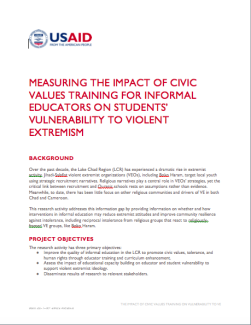Over the past decade, the Lake Chad Region (LCR) has experienced a dramatic rise in extremist activity. Jihadi-Salafist violent extremist organizations (VEOs), including Boko Haram, target local youth using strategic recruitment narratives. Religious narratives play a central role in VEOs’ strategies, yet the critical link between recruitment and Quranic schools rests on assumptions rather than evidence. Meanwhile, to date, there has been little focus on other religious communities and drivers of VE in both Chad and Cameroon.
This research activity addresses this information gap by providing information on whether and how interventions in informal education may reduce extremist attitudes and improve community resilience against intolerance, including reciprocal intolerance from religious groups that react to religiously-framed VE groups, like Boko Haram.
PROJECT OBJECTIVES
This research activity has three primary objectives:
- Improve the quality of informal education in the LCR to promote civic values, tolerance, and human rights through educator training and curriculum enhancement.
- Assess the impact of educational capacity building on educator and student vulnerability to support violent extremist ideology.
- Disseminate results of research to relevant stakeholders.
The research is guided by the following questions:
- Will civic education interventions and critical thinking training among informal educators from all represented faiths in the LCR increase the beneficiary's resistance to and resilience in the face of extremist ideas? In this study, civic values are defined by a curriculum focused on tolerance and pluralism, human rights, non-violence, and conflict resolution.
- Will the same interventions and training reduce cognitive, behavioral, or affective attitudes found to predict extremism in light of beneficiaries' own religious and ethnic identities?
IMPLEMENTATION
This research consists of two parts: a pilot educational intervention and a research component, both conducted with informal education centers in Chad and Cameroon.
Educators will be trained to apply and teach civic values and critical thinking skills on social topics related to violent extremism, such as attitudes toward religious outgroups, peacebuilding, and the management of prejudices toward religious and ethnic outgroups.
The impact assessment will identify whether and how attitudes among beneficiaries change, specifically along social, behavioral, and cognitive dimensions of tolerance/prejudice toward religious outgroups and support for non-violence. Critical thinking skills will also be assessed as a suspected mediating factor.
This research activity will provide new evidence on how interventions in constructive pedagogy and civic values may affect community resistance to violent extremism among informal educators and students in the LCR.
PROGRAM INFORMATION
GOAL: Investigate the impact of exposure to civic values and constructive pedagogy on extremist attitudes among informal educators and their students in the Lake Chad Region (LCR).
LIFE OF PROGRAM: August 2020 – August 2022
TOTAL USAID FUNDING: U.S. $1.5 million
GEOGRAPHIC FOCUS: Cameroon, Chad
IMPLEMENTING PARTNER: The International Center for Religion & Diplomacy (ICRD), in partnership with the Salam Institute for Peace and Justice (Salam)

